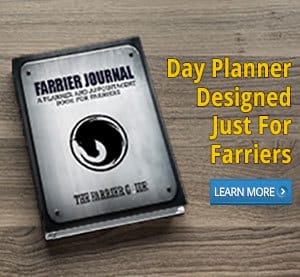Is Farriery Right for me?
Though it’s possible to get by as a farrier with just a love of horses and a good work ethic, to really thrive in the trade requires a few key attributes. So to really know whether you should become a farrier or not requires looking at yourself objectively and asking a few questions.
Physical demands
Farriery is a physically demanding job that requires being in relatively good shape with strong legs, wrist and back. One rule of thumb to know whether you can handle the job is if you can lift 75 pounds in weight. But don’t let these requirements discourage you. If you’re borderline fit, but have been wanting to improve your fitness, now’s your chance—you have a great reason to get in shape! All kinds of people become farriers, so you can too.
Business sense
 |
| Farrier at work | photo: 7tenths (CC-BY) |
Farriery is largely a self-employed occupation, so it requires some business sense. You have to be fine with marketing yourself otherwise you won’t find any work. You also have to be OK with handling paperwork and juggling a variety of other tasks that business owners typically deal with, such as answering clients’ questions and networking. The job also requires accountability since you’ll be responsible for your clients’ horses.
The top personal qualities required to become self employed are the following:
- self-motivated
- perseverance
- hard worker
- focused
- resourceful
- self-confident
- having the courage to step outside the comfort zone
- recognizing your strengths and weaknesses (and leveraging your strengths)
- having a strong vision
If those qualities do not describe you then you may want to reconsider starting a farrier business before going through all the trouble (or cutting your losses if you have already done so) because running a business is not easy and you don’t want to dread going to work every day. If you enjoy working as a farrier, but can’t handle all the other tasks that come along with running a business like promoting your business or bookkeeping, you’d be better off working for someone else, even if that means having less control over your hours and getting paid less.
Hands-on job
Since farriery is a hands-on job it requires certain skills in order to be successful. According to the Pennsylvania Institute of Horseshoeing, some helpful questions to ask yourself include:
- Are you patient under trying situations?
- Do you have an eye for proportion?
- Can you remain calm when a large animal makes a sudden move?
- Can you make decisions on your own?
Interpersonal skills
As a farrier you’ll be working with horses all day so you obviously have to be a horse lover. But you’ll also be working with people, so you have to like and get along well with people too.
Learning style
Everyone learns differently. People fall into three general camps based on their natural learning style: visual, kinesthetic and auditory. It would be rare for someone to fall into one camp only since most people learn in multiple ways, but have a tendency towards one style or another. If you don’t know what your learning style is, take a free test. Farriery is a hands-on skill so learning it will be more kinesthetic than anything else. But it also takes a good amount of theoretical knowledge to understand horse anatomy. So if you happen to be a visual learner who learns well by reading books, anatomy will be one area of your studies that will be easier for you than for a kinesthetic or auditory learner.
Personality type
If you’re new to the working world and aren’t too clear about your personality traits (or if you’d like some further clarification!) take a career personality test such as: http://www.careertest.net or http://www.keirsey.com. It’s important not to read too much into these tests as they’re just an objective “measure” of oneself and by no means indicate who you really are and where your passions lie.
However, you might just find out that your personality type doesn’t fit well with the farriery profession and decide that the job isn’t right for you. If so, don’t despair. It’s actually a good thing that you’ve found this out now rather than after investing all the time, money and energy going to school. Or worse yet, going to school then working for several years in a job that you don’t like.
A journeyman farrier talks about working as a farrier:









Love the website!!! Thank you so much for the beneficial information.
who is the author and how would i cite this in an essay ?
Hi Hallie, the author is Keith Templeton and you would follow the citation rules that you’d use for any other website. Glad you’ve found it useful!
Thank you for your comment about asking yourself if you can do things like remain calm when a large animal makes a sudden move. My husband has been always interested in being a farrier, but he doesn’t have any of the tools. I will be sure to forward this article to him so that he can see if it is a good job fit for him, and then we will look into the tools needed.